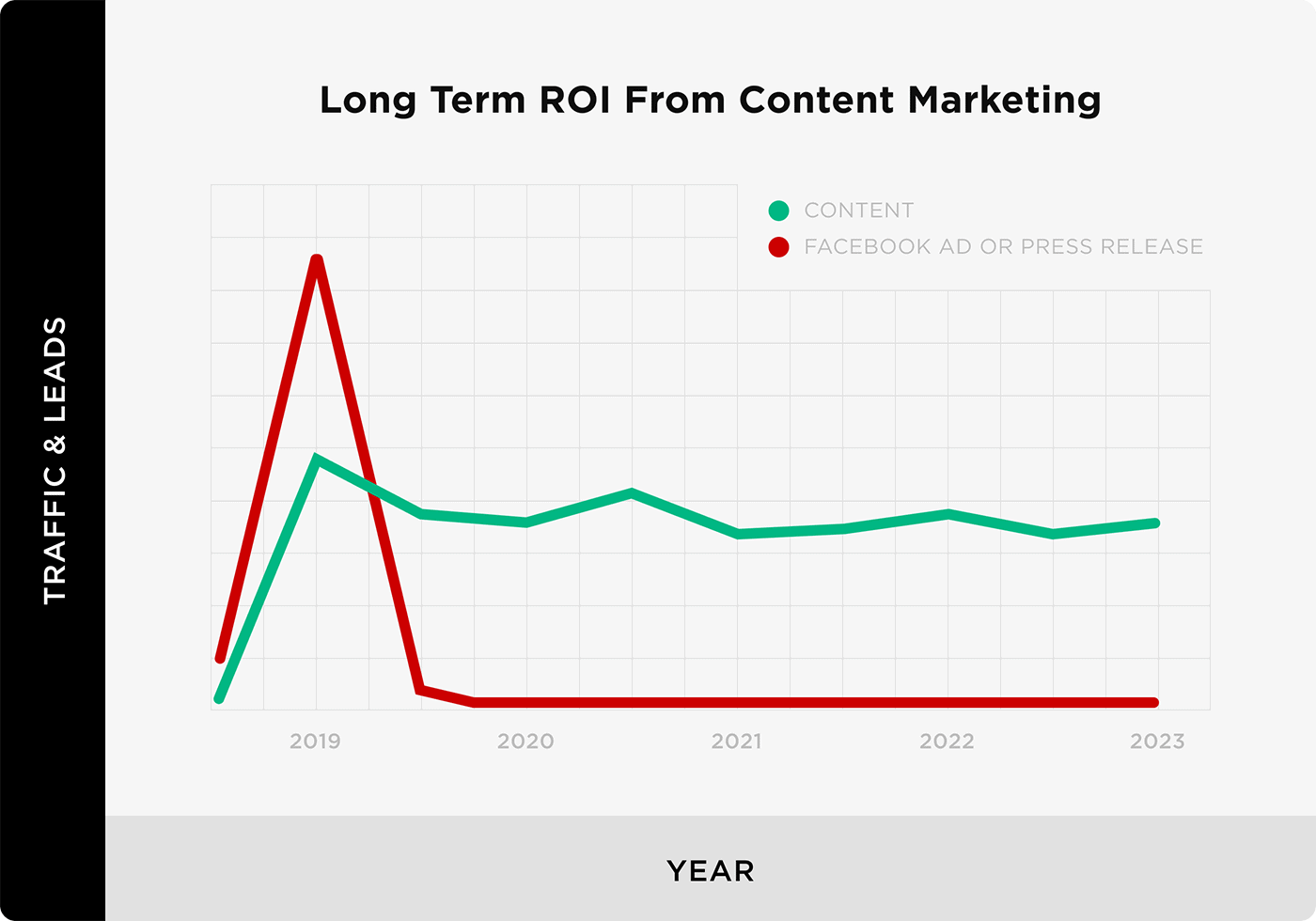6 Reasons You Shouldn’t Invest in Content Marketing (And Why You Should Ignore Them)
You’ve heard it all before: “Content is king,” “You need a blog,” “Invest in content marketing for long-term growth.”
But what if we told you that you shouldn’t bother with content marketing at all? In fact, here are 6 compelling reasons why you should steer clear of it.
But before you close this tab, stick around to find out why these reasons might be the very things that are holding you back from true business success.
The Common Arguments Against Content Marketing
Before diving into the reasons you’ve heard about why you shouldn’t invest in content marketing, let’s debunk some common myths and content marketing mistakes that often circulate in the industry.
It’s Too Time-Consuming
The Myth:
Many businesses shy away from content marketing with the belief that content marketing takes too long or is too time-consuming. The idea of consistently creating high-quality content can seem overwhelming, especially for small teams.
The Reality:
Yes, content marketing takes time, but so does any worthwhile marketing strategy. The key is to create a content calendar, delegate tasks, and perhaps most importantly, repurpose content. One well-researched blog post can be turned into multiple social media posts, an infographic, and even a podcast episode. Plus, the long-term benefits far outweigh the initial time investment.
ROI is Hard to Measure
The Myth:
Another argument against content marketing is that its ROI is difficult to measure. Unlike PPC campaigns where you can see immediate results, content marketing is often seen as a “soft” strategy with nebulous returns.
The Reality:
While it’s true that content marketing often involves long-term strategies that focus on adding customer value, that doesn’t mean ROI is harder to measure. Metrics like website traffic, time spent on page, leads, conversion rates, and customer lifetime value can all give you a clear picture of how your content marketing ROI. (Our clients see an average of 7x ROI!)
And let’s not forget the value of brand awareness and customer loyalty, which are harder to quantify but equally important.
Everyone’s Doing It, So Why Bother?
The Myth:
With so many businesses jumping on the content marketing bandwagon, it’s easy to think that the market is oversaturated. Why bother when everyone else is doing the same thing?
The Reality:
Yes, content marketing is popular, but that’s because it works. The key to standing out isn’t to avoid content marketing; it’s to do it better. Find your unique voice, target your specific audience, and offer value that no one else can. In a world where everyone is shouting, the most compelling voice is not the loudest, but the most insightful.
1. You’d Rather Promote Than Educate
Why You Shouldn’t Bother:
If your marketing strategy revolves around pushing your products or services onto people who don’t even know they need them, then content marketing isn’t for you. After all, why educate when you can hard-sell, right?
Why You Should Ignore This:
The reality is, today’s consumers are savvy. They can smell a sales pitch from a mile away. Content marketing allows you to provide valuable content your customers actually want. It also helps you establish trust, and position yourself as an industry leader. When you educate your audience, you’re not just selling a product; you’re building a relationship.

2. You Love Wasting Money on Ads
Why You Shouldn’t Bother:
If you’re a fan of throwing your marketing budget into the black hole of non-converting ads, then you don’t need content marketing. Keep doing what you’re doing.
Why You Should Ignore This:
Ads can be effective, but they’re also expensive and offer short-term gains. Content marketing, on the other hand, is the gift that keeps on giving. A well-crafted blog post can generate traffic and leads for years, offering a better ROI in the long run.

3. You’re Drowning in Leads and Clients
Why You Shouldn’t Bother:
If your sales team is so overwhelmed with leads that they’re considering early retirement, then you clearly don’t need more content to generate interest. Most of our SaaS clients want growth like now.
Why You Should Ignore This:
Even if you’re doing well now, markets change. Consumer behavior shifts. A robust content marketing strategy can help you weather those changes and keep your pipeline full with a steady growth of relevant search rankings that deliver interested buyers:

4. Marketing Strategy? What Strategy?
Why You Shouldn’t Bother:
If you’re the kind of business leader who thinks planning is for the weak, then the strategic nature of content marketing will be a turn-off for you.
Why You Should Ignore This:
Flying by the seat of your pants might work in the short term, but it’s not a sustainable strategy. Content marketing requires planning, but that planning pays off in consistent messaging, a cohesive brand image, and long-term growth.

Source: 10 Templates for Content Marketing
5. Paid Traffic is Your Jam
Why You Shouldn’t Bother:
If you love paying for every single visitor to your website, then the organic reach of content marketing will be a real downer for you.
Why You Should Ignore This:
Paid traffic can get you quick wins, but it’s like renting your audience. Content marketing allows you to own your audience. Plus, organic search results are more trusted than paid ads.
6. Short-Term Gains Over Long-Term Growth
Why You Shouldn’t Bother:
If you’re all about the here and now and have no interest in setting yourself up for future success, then content marketing will be too slow for you.
Why You Should Ignore This:
Short-term tactics can offer quick boosts, but they’re not a foundation for growth. Content marketing is a long-term strategy that builds on itself over time, setting you up for sustained success.
From our case study of regional homebuilder Oberer Homes
The Real Costs of Not Investing in Content Marketing
When businesses decide not to invest in content marketing, they often overlook the significant opportunity costs involved. Let’s break down what you’re really missing out on and why content marketing is actually a cost-effective strategy in the long run.
The Opportunity Cost of Ignored Audiences
What You’re Missing:
By not investing in content marketing, you’re essentially ignoring a large segment of your potential audience. These are the people who prefer to consume content and educate themselves before making a purchase decision.
The Comparison:
Traditional advertising often targets only those who are ready to buy now, leaving out a significant portion of the customer journey. Content marketing nurtures relationships from the awareness stage to the decision stage, increasing the likelihood of conversions over time.
The High Cost of Paid Advertising
What You’re Missing:
Paid advertising can be effective, but it’s often expensive and offers only short-term gains. Once you stop paying, the traffic stops.
The Comparison:
Content marketing, on the other hand, is the gift that keeps on giving. A well-crafted blog post can continue to attract organic traffic for years, offering a much better ROI in the long run. Plus, organic leads are generally more qualified and easier to convert than leads from paid sources.
The Risk of Brand Invisibility
What You’re Missing:
Without a solid content marketing strategy, your brand risks becoming invisible in a crowded marketplace. You miss the chance to establish thought leadership and build brand loyalty.
The Comparison:
While other forms of marketing like social media ads or influencer partnerships can boost your brand’s visibility, they often lack the depth and staying power of content marketing. A well-executed content strategy can turn your brand into a go-to resource, creating lasting relationships with your audience.
The Cost of Short-Term Thinking
What You’re Missing:
By focusing solely on short-term gains, you’re setting your business up for potential failure in the long run. Markets change, consumer behavior evolves, and what works today may not work tomorrow.
The Comparison:
Content marketing is a long-term strategy that builds on itself over time. Each piece of content you create adds value to your brand and attracts more potential customers, setting you up for sustained success.
FAQs: Content Marketing Concerns Addressed
We get it; diving into the world of content marketing can feel like a big commitment. You’ve got questions, and we’ve got answers. Let’s tackle some of the most common concerns businesses have about when considering not investing in content marketing.
Q: How Long Does It Take to See Results from Content Marketing?
A: Content marketing is a marathon, not a sprint. While you might not see immediate results, most businesses start to notice increased traffic and engagement within 3-6 months. The real ROI, however, often becomes evident after a year or more of consistent effort.
Q: Is Content Marketing Only for B2B Companies?
A: Absolutely not! While content marketing is often associated with B2B, it’s equally effective for B2C businesses. The key is to tailor your content to your specific audience’s needs and interests, whether that’s industry insights or lifestyle tips.
Q: Do I Need a Big Team to Manage Content Marketing?
A: Not necessarily. While having a dedicated team can be beneficial, even small businesses can succeed with a well-planned content strategy. Outsourcing, automation tools, and a strong editorial calendar can go a long way.
Q: What Types of Content Should I Create?
A: The types of content you should create depend on your audience and your business goals. Blog posts are a good starting point, but don’t limit yourself. Videos, podcasts, infographics, and even webinars can be powerful tools in your content marketing arsenal.
Q: How Do I Measure the Success of My Content Marketing Strategy?
A: Success metrics can vary depending on your goals. However, common KPIs include website traffic, time spent on page, conversion rates, and customer lifetime value. Don’t forget to also consider qualitative metrics like brand awareness and customer loyalty.
Q: Is Content Marketing Worth the Investment?
A: In a word, yes. While content marketing requires an upfront investment of time and resources, the long-term benefits—increased brand awareness, customer loyalty, and a steady stream of organic leads—make it a worthwhile endeavor for most businesses.
Conclusion
So there you have it: 6 reasons why you shouldn’t invest in content marketing. But if you’ve read this far, chances are you’re not convinced by these reasons. And that’s a good thing. Because the truth is, these are all misconceptions that can hold you back from achieving your full business potential.
By not investing in content marketing, you’re not just saving money; you’re missing out on growth opportunities and long-term success. So, before you write off content marketing as an unnecessary expense, consider the real costs of not taking it seriously.
Ready to ignore the naysayers and invest in a strategy that offers real, sustainable growth? Then maybe it’s time we talk. Contact us to find out how we can help you build a content marketing strategy that actually works.
If you are ready to get more traffic to your site with quality content published consistently, check out our SEO Blog Writing Service or schedule a quick consultation to learn more about how we can help you earn more traffic and leads for your business.








